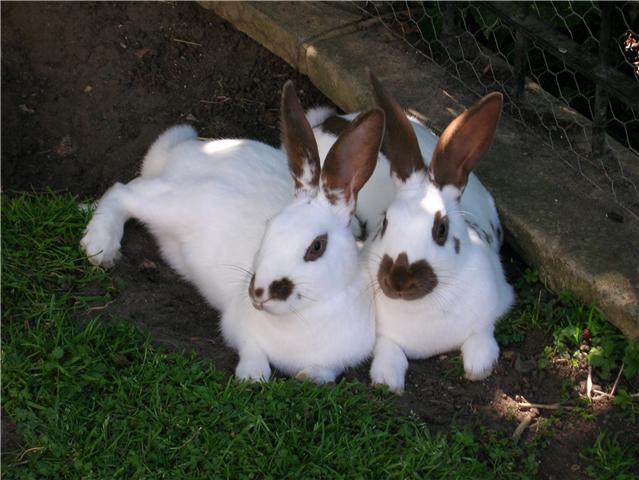BASIC CARE - know what your rabbits need.
FOOD AND WATER
Rabbits mostly need to eat good quality hay or grass with some complete or pellet food and vegetables. You can ask your vet, pet shops or a breeder for advice.
Always make sure your rabbits have fresh, clean water – use a drip-feed water bottle available from pet shops.
HOUSING
Provide a big enough living area for each of your rabbits to lie fully stretched out in any direction, take a sequence of hops, turn around easily and sit up on their hind legs – without their ears touching the roof.
Give your rabbits a properly built, extensive living enclosure with a spacious shelter. The living enclosure and shelter should be protected from potential predators, direct sunlight and wind or rain.
Droppings and wet litter should be removed daily and bedding changed at least twice a week. Wash, disinfect and thoroughly dry your rabbits’ living area three or four times a year.
COMPANY
Make sure your rabbit has company – if he/she doesn’t have another rabbit for company, be prepared to spend extra time playing with your rabbit every day.
TO BEHAVE NORMALLY
If your rabbits’ shelter does not have a run attached, let them run and hop around during the day in a secure enclosure in the garden or around the house. Do not leave your rabbits in a hutch all day long.
TO BE HEALTHY
Get to know your rabbits – you will soon be able to spot the signs if something is wrong. Take your rabbits to the vet if they are unwell or injured. Don’t leave it too late – if you are unsure, ask your vet for advise.
Have your rabbits neutered to prevent unwanted pregnancies and stop fighting. Rabbits are easy to house-train and may make affectionate household pets. But they do chew a lot, so all electric cables must be protected. They will need a safe, secure, restricted area when you leave them unattended.SPAYING/ NEUTERING
Females can be spayed as soon as they sexually mature, usually around 4 months of age, but many veterinarians prefer to wait until they are 9 months old, as surgery is riskier on a younger rabbit.
Males can be neutered as soon as the testicles descend, usually around 3 1/2 months of age, but many veterinarians prefer to wait until they are 6 months old.
Vaccinations
The disease Myxomatosis was used in France by a physician to control the rabbit population on his country estate near Paris. The disease spread rapidly and was accidentally brought into Britain. Some farmers have used infected rabbits to control the population on their own farms. The virus which causes myxo is a type of pox virus which grows in the skin of rabbits. It is spread by blood sucking insects, in European countries the mosquito is known to be a carrier of myxo, and there has been some evidence that this is true in Britain also. Myxo can live in the blood of these insects for many months. When the insect bites the rabbit it leaves behind a small amount of the virus in the skin as it sucks the blood. Within a few days the virus passes into the blood of the rabbit. Sometimes it can be as much as two weeks, from the introduction of the virus, before any outward signs are seen that the rabbit is unwell. The symptoms are severely inflamed eyes with a discharge and as the disease progresses swollen face, discharge from the nose and difficulty in breathing. Some rabbits can survive for weeks or even months after becoming infected but in general a severe infection of myxo will result in death within two weeks.
VHD (Viral Haemorrhagic Disease) was first reported in Britain in 1992, it has now spread throughout the country and several thousand of rabbits have died from it. This is a particularly nasty virus which is easily spread. VHD can be transported by people, it is known to survive on clothing for at least three months. It can also be spread between rabbits, via contaminated hutches, bedding or food. The symptoms are loss of appetite, nose bleeds, internal bleeding in the lungs, gut and urinary tract. Death, in about 50% of cases, occurs very quickly sometimes without the owner ever knowing there was anything wrong.
Vaccination of your rabbit against these two infectious diseases is carried out when the rabbit is over 6 weeks old. The vaccine protects your own pet and prevents it from being a carrier of disease and spreading infection. Immunity to these diseases does not last indefinitely so regular updates are vital to maintain this.
Once your rabbit has had its vaccinations you will be given a vaccination certificate which will have your pet's details on it, the dates the vaccines were given and when the next one is due. This certificate is important, especially if you are going on holiday and you require someone to look after your pet. Some boarding kennels and catteries cater for rabbits as well as dogs and cats. Many of these places will not accept your rabbit unless you can show this certificate and it is up to date. Your veterinary surgeon will send you out a reminder when the next vaccination is due.
The law that protects pets has changed. You have a legal responsibility to care for you rabbits.
This is very basic information.
